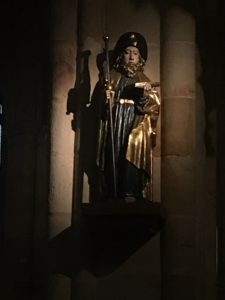 From long before the Camino: The Odyssey is one of the most ancient stories, still informing us of what mattered most to our ancient forebears. The story is a worthy starting point for our own struggle for personal transformation as we make sense of our own lives.
From long before the Camino: The Odyssey is one of the most ancient stories, still informing us of what mattered most to our ancient forebears. The story is a worthy starting point for our own struggle for personal transformation as we make sense of our own lives.
It tells the story of Odysseus who, having offended the god Poseidon, was drug all over the eastern Mediterranean, in need of shelter and assistance. He encountered both terrible dangers, and loving care. His ultimate desire was to make it back home to his wife, Penelope. She had her own set of troubles, as unworthy guests attempted to take as much advantage of her as they could.
A number of themes surface in the Odyssey, often springing from Odysseus’ personal failings. A key motif was the price of exaggerated pride. Hubris for his role in the fall of Troy was at the core of Odysseus’ suffering. There was no going home until he has served his fated time.
Survival for Odysseus, both on his travels, includes a fair amount of deception, outwitting the Cyclops, Polyphemus, Poseidon’s son, for which Odysseus was also punished, and returning home disguised to overcome his wife’s suitors. We come to see that he was a cunning man, strong and courageous if not necessarily always a good or faithful one. His character was always a question, and always at play, and sometimes for the good. For all his faults, he managed at some key points to avoid the temptations that his companions readily fell for, surviving to make it home.
On a side note, other key themes of the Odyssey include the dangers and opportunities of offering hospitality. Hosts are wise to be ready for trouble, yet demonstrate their worth by their treatment of strangers. On the Camino, we are strangers, and in need of welcome and generosity from others. Will the experience change the way we offer hospitality when we return home?
Matt 14:26-33 – 27When the disciples saw [Jesus] walking on the sea they were terrified. “It is a ghost,” they said, and they cried out in fear. 27 At once [Jesus] spoke to them, “Take courage, it is I; do not be afraid.” 28 Peter said to him in reply, “Lord, if it is you, command me to come to you on the water.” 29 He said, “Come.” Peter got out of the boat and began to walk on the water toward Jesus. 30 But when he saw how [strong] the wind was he became frightened; and, beginning to sink, he cried out, “Lord, save me!” 31 Immediately Jesus stretched out his hand and caught him, and said to him, “O you of little faith, why did you doubt?” 32 After they got into the boat, the wind died down. 33 k Those who were in the boat did him homage, saying, “Truly, you are the Son of God.”
For reflection: Peter is a character of passion, commitment, flaws and failure – and yet he has the good sense to cry out for salvation from the one who, in fact, could save. Odysseus, too, was both talented and deeply flawed. Maybe you are too? We all of us come with natural strengths that aid us in life, personal flaws that dog us with all kinds of consequences, and talents that both help and betray us, depending on our use of them. We are complicated people.
The odyssey was a time for admitting and addressing inner faults. Peter had years to journey with Jesus, who regularly upbraided Peter for his arrogant moments, and warned him, unsuccessfully of his greatest betrayal. Peter, though, was not a wise man who could learn from the mistakes of others. He seemed to learn only from his blunders. Just as Peter and Odysseus needed to learn from their mistakes, so do we. It begins with honest self-analysis. This can begin by a review of the faults we consistently bring to the sacrament of reconciliation. Are there items always on the list that the present moment allows us to probe? Are there any disgruntled points of dissatisfaction we hear from our family members or friends, about our behavior, that we have ignored? Perhaps the journey gives us the time and the privacy to consider if there is any truth to their concerns.
Even though no one else is dragging us onto pilgrimage to make recompense for our failings, as was a common practice in Medieval pilgrimage, and even though, unlike Odysseus, we can go home at any time, there is the open space of the Camino that permits us to probe our own hubris, our trickster ways, our dogged faults, and perhaps find root causes, and maybe even solutions.
So…how do you need to change? How do you need to grow? What transformation of you is needed?